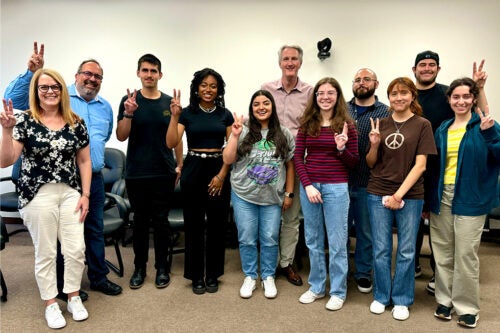
Summer sustainability internship equips community college students for success
Alejandro Hernandez takes his education very seriously. He’s the first in his family to attend college, pursuing majors in both chemistry and computer science at Cerritos Community College in Norwalk, Calif.
“I can see myself working at a research-based job in the future,” he says. And to help him get there, he applied for — and earned a spot in — the USC-Cerritos College Summer Research Internship in Sustainability, based at the USC Dornsife College of Letters, Arts and Sciences.
Conceived in 2010 by Richard Brutchey, professor of chemistry at USC Dornsife, and Jeff Bradbury, professor of chemistry at Cerritos College, the program pairs Cerritos undergraduate students with graduate student mentors from USC Dornsife’s Department of Chemistry. The goal is to encourage community college students to pursue degrees in science, technology, engineering and math (STEM) fields.
“I got involved with the program a year ago, and already I can see how beneficial it is for the students,” said Michael Page, Cerritos’ instructional dean of science, engineering and mathematics.
During the eight-week, paid summer internship, Hernandez and five other Cerritos students performed sophisticated laboratory research, guided by the doctoral candidates as well as a USC faculty mentor.
“I had the chance to take everything that I learned in class that is more theoretical and apply it through real-world scenarios that are happening right now in the field,” said Hernandez. “I wish I could stay longer. Working in a research lab is fascinating, and I get to learn new techniques as well as improve my current techniques and skills.”

Though partially funded through federal grants to the program’s six principal investigators, the program has increasingly benefited from significant contributions by longtime supporters Steve and Cathy Gagliardi. Their contribution has been matched by support from Agilent Technologies Inc., a global research, development and manufacturing company.
“We feel the experience of exposure to professors, graduate students and advanced research capabilities afforded by this relationship is invaluable,” said Steve Gagliardi, vice president of marketing at Agilent.
The program has trained 47 interns since its inception. All interns from previous summers have gone on to four-year institutions, with four studying at USC. Several went on to pursue graduate degrees — five in chemistry PhD programs, one in a biology PhD program, and one in a PharmD program. Three landed chemistry post-doctoral positions, and many have launched careers with organizations such as Thermo Fisher Scientific, SpaceX and Meta.
Bradbury says support from Agilent and the Gagliardis was vital to the program’s success. “The program would not have been able to grow to help as many students each summer without the Gagliardis.”
Steve Gagliardi noted that the benefits go beyond the interns. “The graduate students that help mentor the summer interns gain valuable experience in their development as the next generation of the scientific community,” he said.
Jazmine Prana, a fourth-year PhD candidate studying under USC Dornsife Assistant Professor of Chemistry Michael Inkpen, served as Hernandez’s graduate student mentor. “Having the opportunity to mentor pushes me out of my comfort zone,” she said. “It’s taught me how to explain things better. That’s something that’s been helpful for me —learning how to break things down in a way that people can easily understand.”
She says the program has proven to be a valuable networking opportunity for the interns and mentors, as well. “We’ve connected with each other on LinkedIn and exchanged emails, so this is not the end of our working relationship.”
In late July, the interns presented their work to students and faculty as well as the Gagliardis, who attended via Zoom to witness firsthand the impact the internship had on each student.
Summarizing their research and fielding complex questions from faculty, each intern demonstrated a firm grasp of theoretical concepts, an ability to analyze findings and re-direct as needed, and confident mastery of public speaking — all invaluable skills for future growth.
“We were impressed and excited about how fast the students learned their laboratories and research,” Cathy Gagliardi said. “They spoke with excitement and understanding of the work they were performing.”
Bradbury agreed. “It’s amazing to see the transformation,” he said. “In eight weeks, they go from being somewhat unsure of themselves to presenting like experts, explaining concepts that are even new to me.”
The program gave Hernandez his first opportunity to work in a lab. Now, he says, he can easily envision himself pursuing a PhD and a STEM career. He’s considering PhD programs to pursue after he earns his bachelor’s degree, knowing that this will give him a considerable advantage when applying for high-paying positions in industry.
“Even if I’m not going directly into the field of molecular nanoscience, I can use everything that I learned in this internship to apply to other fields related to chemistry,” he said.